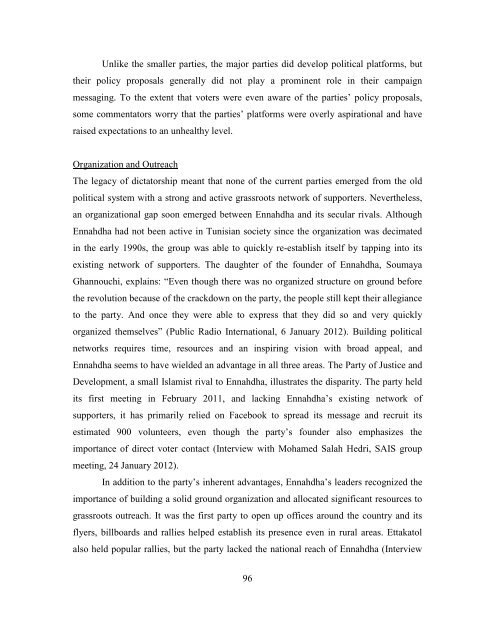Tunisia: Understanding Conflict 2012 - Johns Hopkins School of ...
Tunisia: Understanding Conflict 2012 - Johns Hopkins School of ...
Tunisia: Understanding Conflict 2012 - Johns Hopkins School of ...
Create successful ePaper yourself
Turn your PDF publications into a flip-book with our unique Google optimized e-Paper software.
Unlike the smaller parties, the major parties did develop political platforms, but<br />
their policy proposals generally did not play a prominent role in their campaign<br />
messaging. To the extent that voters were even aware <strong>of</strong> the parties’ policy proposals,<br />
some commentators worry that the parties’ platforms were overly aspirational and have<br />
raised expectations to an unhealthy level.<br />
Organization and Outreach<br />
The legacy <strong>of</strong> dictatorship meant that none <strong>of</strong> the current parties emerged from the old<br />
political system with a strong and active grassroots network <strong>of</strong> supporters. Nevertheless,<br />
an organizational gap soon emerged between Ennahdha and its secular rivals. Although<br />
Ennahdha had not been active in <strong>Tunisia</strong>n society since the organization was decimated<br />
in the early 1990s, the group was able to quickly re-establish itself by tapping into its<br />
existing network <strong>of</strong> supporters. The daughter <strong>of</strong> the founder <strong>of</strong> Ennahdha, Soumaya<br />
Ghannouchi, explains: “Even though there was no organized structure on ground before<br />
the revolution because <strong>of</strong> the crackdown on the party, the people still kept their allegiance<br />
to the party. And once they were able to express that they did so and very quickly<br />
organized themselves” (Public Radio International, 6 January <strong>2012</strong>). Building political<br />
networks requires time, resources and an inspiring vision with broad appeal, and<br />
Ennahdha seems to have wielded an advantage in all three areas. The Party <strong>of</strong> Justice and<br />
Development, a small Islamist rival to Ennahdha, illustrates the disparity. The party held<br />
its first meeting in February 2011, and lacking Ennahdha’s existing network <strong>of</strong><br />
supporters, it has primarily relied on Facebook to spread its message and recruit its<br />
estimated 900 volunteers, even though the party’s founder also emphasizes the<br />
importance <strong>of</strong> direct voter contact (Interview with Mohamed Salah Hedri, SAIS group<br />
meeting, 24 January <strong>2012</strong>).<br />
In addition to the party’s inherent advantages, Ennahdha’s leaders recognized the<br />
importance <strong>of</strong> building a solid ground organization and allocated significant resources to<br />
grassroots outreach. It was the first party to open up <strong>of</strong>fices around the country and its<br />
flyers, billboards and rallies helped establish its presence even in rural areas. Ettakatol<br />
also held popular rallies, but the party lacked the national reach <strong>of</strong> Ennahdha (Interview<br />
96
















